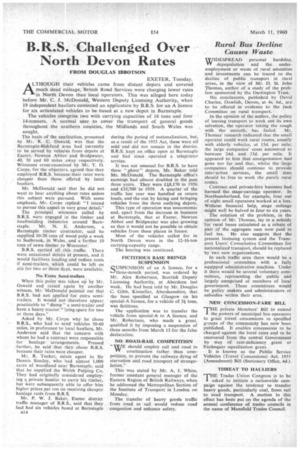Rural Bus Decline Causes Waste
Page 48

If you've noticed an error in this article please click here to report it so we can fix it.
WIDESPREAD personal hardship, depopulation arid the underemployment or waste of rural amenities and investments can be traced to the decline of public transport in rural areas, in the view of Mr. D. St. John Thomas, author of a study of the problem sponsored by the Dartington Trust.
His conclusions, published by David Charles, Dawlish, Devon, at 4s. fid., are to be offered in evidence to the Jack Committee on rural transport.
In the opinion of the author, the policy of leaving transport to work out its own salvation, the operator taking the rough with the smooth, has failed. Mr. Thomas' research indicated that the small operator could work rural routes, usually with elderly vehicles, at 15d. per mile; the large companies' costs amounted to between 24d. and 33d. per mile. It appeared to him that amalgamation had gone too far and that, whilst the large companies should continue to provide inter-urban services, the small man should he free to work the purely rural routes.
Contract and private-hire business had harmed the stage-carriage operator. In Northumberland, for example, four out of eight small operators worked at a loss. Without financial help, stage mileage might well be halved in four to six years.
The solution of the problem, in the opinion of Mr. Thomas, lay in a subsidy -for rural buses calculated as a rebate of part of the aggregate sum now paid in fuel tax. He also suggests that the present licensing system and the Transport Users' Consultative Committees for nationalized transport, should be replaced by two new organizations.
In each traffic area there would be a professional committee with a fully equipped administrative machine. Under it there would be several voluntary committees, representing the public and largely comprised of members of local government. These committees would be policy makers and administrators of subsidies within their area.
NEW CONCESSION-FARE BILL
THE private Members' Bill to extend the powers of municipal bus operators to grant travel concessions to specified groups of the community has now been published. It enables concessions to be charged against the local rates and to be recovered from the central Government by way of rate-deficiency grant or Exchequer equalization grant.
It is known as the Public Service Vehicles (Travel Concessions) Act, 1955 (Amendment) Bill (Stationery Office, 4d.).
THREAT TO HAULIERS
THE Trades Union Congress is to be asked to initiate a nationwide campaign against the tendency to transfer heavy goods, particularly coal, from rail to road transport. A motion to this effect has been put on the agenda of the annual conference of trades councils in the name of Mansfield Trades Council.




































































































































